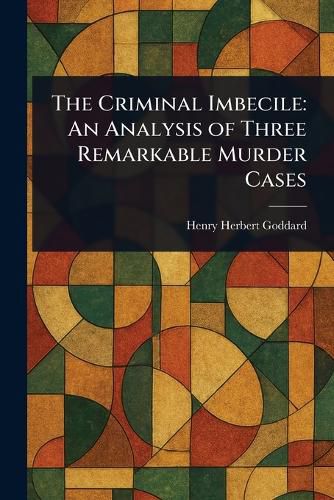Readings Newsletter
Become a Readings Member to make your shopping experience even easier.
Sign in or sign up for free!
You’re not far away from qualifying for FREE standard shipping within Australia
You’ve qualified for FREE standard shipping within Australia
The cart is loading…






This title is printed to order. This book may have been self-published. If so, we cannot guarantee the quality of the content. In the main most books will have gone through the editing process however some may not. We therefore suggest that you be aware of this before ordering this book. If in doubt check either the author or publisher’s details as we are unable to accept any returns unless they are faulty. Please contact us if you have any questions.
"The Criminal Imbecile: An Analysis of Three Remarkable Murder Cases" by Henry Herbert Goddard delves into the intersection of criminology and psychology through detailed case studies. Goddard, a pioneer in forensic psychology, meticulously examines three murder cases, offering a chilling glimpse into what he terms "criminal imbecility."
This exploration of murder cases provides invaluable insights into early 20th-century forensic techniques and perspectives on penology. Goddard's work represents a significant contribution to the fields of criminology and forensic psychology, providing a historical lens through which to view our understanding of criminal behavior.
A crucial text for anyone interested in the history of criminology, forensic psychology, or the development of penological theory, "The Criminal Imbecile" presents a fascinating, if unsettling, look at the minds behind the crimes. This edition preserves the original text, offering unedited access to Goddard's groundbreaking analysis.
This work has been selected by scholars as being culturally important, and is part of the knowledge base of civilization as we know it.
This work is in the public domain in the United States of America, and possibly other nations. Within the United States, you may freely copy and distribute this work, as no entity (individual or corporate) has a copyright on the body of the work.
Scholars believe, and we concur, that this work is important enough to be preserved, reproduced, and made generally available to the public. We appreciate your support of the preservation process, and thank you for being an important part of keeping this knowledge alive and relevant.
$9.00 standard shipping within Australia
FREE standard shipping within Australia for orders over $100.00
Express & International shipping calculated at checkout
This title is printed to order. This book may have been self-published. If so, we cannot guarantee the quality of the content. In the main most books will have gone through the editing process however some may not. We therefore suggest that you be aware of this before ordering this book. If in doubt check either the author or publisher’s details as we are unable to accept any returns unless they are faulty. Please contact us if you have any questions.
"The Criminal Imbecile: An Analysis of Three Remarkable Murder Cases" by Henry Herbert Goddard delves into the intersection of criminology and psychology through detailed case studies. Goddard, a pioneer in forensic psychology, meticulously examines three murder cases, offering a chilling glimpse into what he terms "criminal imbecility."
This exploration of murder cases provides invaluable insights into early 20th-century forensic techniques and perspectives on penology. Goddard's work represents a significant contribution to the fields of criminology and forensic psychology, providing a historical lens through which to view our understanding of criminal behavior.
A crucial text for anyone interested in the history of criminology, forensic psychology, or the development of penological theory, "The Criminal Imbecile" presents a fascinating, if unsettling, look at the minds behind the crimes. This edition preserves the original text, offering unedited access to Goddard's groundbreaking analysis.
This work has been selected by scholars as being culturally important, and is part of the knowledge base of civilization as we know it.
This work is in the public domain in the United States of America, and possibly other nations. Within the United States, you may freely copy and distribute this work, as no entity (individual or corporate) has a copyright on the body of the work.
Scholars believe, and we concur, that this work is important enough to be preserved, reproduced, and made generally available to the public. We appreciate your support of the preservation process, and thank you for being an important part of keeping this knowledge alive and relevant.